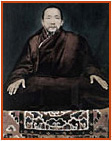Khenpo Yonten Gonpo: Difference between revisions
Bj Lhundrup (talk | contribs) No edit summary |
Bj Lhundrup (talk | contribs) |
||
| Line 28: | Line 28: | ||
*Dzogchen Khenchen kyabje Yongdzin Rinpoche | *Dzogchen Khenchen kyabje Yongdzin Rinpoche | ||
*Jigme Tadrin Yonten Gonpo | *Jigme Tadrin Yonten Gonpo | ||
*Khenpo Gönri | |||
===Other Reference Sources=== | ===Other Reference Sources=== | ||
Revision as of 01:34, 27 October 2008
Name of teacher (name in wylie)
Great Khenpo Jigme Yonten Gonpo was one of the greatest Dzogchen masters in recent times, and was said to be the joint emanation of Jetsun Senge Wangshuk, Jigme Lingpa and Migyur Namkhe Dorje. He was commonly considered to be an incarnation of the primordial Buddha Samantrabhadra.
Born in 1899, Khenpo Jigme Yonten Gonpo studied with many great masters including HE Fifth Dzogchen Rinpoche Tupten Choki Dorje, Great Khenpo of Jagong Shenpen Nangwa, Shadral Kunga Palden, and many more. He received teachings on sutra, tantra and the general sciences, but most importantly Khenpo received all the empowerments, guidance and personal instructions of the Heart Essence of the Great Perfection and became the most important realised lineage holder of his day.
From the throne of Shira Sing Scriptural College, he taught extensively on the sutras and tantras and in the latter part of his life became full time tutor to HE Sixth Dzogchen Rinpoche Jigdral Jangchup Dorje. Through his brilliant personal instructions of the Great Perfection, many of his fortunate students from all over the land became spiritually mature and attained liberation.
During the great upheaval that swept through Tibet, he passed into peace leaving no physical remains, only a few months after the Sixth Dzogchen Rinpoche had died.
Literary Works
Main Teachers
Main Students
- 6th Dzogchen Rinpoche Jigdral Jangchup Dorje
- Pema Kalsang Rinpoche
Main Lineages
Alternate Names
- Khenpo Jigme Yonten Gonpo
- Dzogchen Khenchen kyabje Yongdzin Rinpoche
- Jigme Tadrin Yonten Gonpo
- Khenpo Gönri
Other Reference Sources
Internal Links
- Add double-brackets "[[ ]]" around any relevant word or phrase and it will create a new page for that term or link to an already existing page
External Links
Download for the Sungbum in Tibetan PDF files [1]
